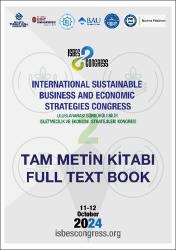Sürdürülebilir tedarik zinciri yönetiminde makine öğrenmesinin uygulanması
Citation
Turan, C.; Koray, M. Sürdürülebilir tedarik zinciri yönetiminde makine öğrenmesinin uygulanması. Uluslararası Sürdürülebilir İşletmecilik ve Ekonomi Stratejileri Kongresi, 11-12 Ekim 2024, 8-16.Abstract
Sürdürülebilir Tedarik Zinciri Yönetimi (SSCM), tedarik zincirlerini ekonomik, sosyal ve
çevresel ilkelerle uyumlu bir şekilde geliştirmeyi, optimize etmeyi ve sürdürmeyi amaçlarken,
bu konuda kapsamlı bir başarı elde edilmesi dijitalleşmenin tamamlanmasına ve büyük verinin
etkin bir şekilde kullanılmasına bağlıdır. Nesnelerin İnterneti (IoT) ve bilgi teknolojilerindeki
ilerlemeler sayesinde dijitalleşmenin yaygınlaşması, tedarik zinciri operasyonlarının
yönetimini kolaylaştırmıştır. Büyük verinin belirli protokol ve standartlara göre depolanmasını
sağlamış ve Sürdürülebilir Tedarik Zinciri Yönetimi (SSCM) içinde Yapay Zeka (AI) analitik
yöntemlerinin uygulanmasını kolaylaştırmıştır. Bu nedenle, bilgisayar tabanlı bir yapay zeka
tekniği olan Makine Öğrenmesi (ML), Sürdürülebilir Tedarik Zinciri Yönetimi (SSCM)
içindeki çeşitli süreçleri analiz etmek için öne çıkan bir araç olarak ortaya çıkmıştır. Bu süreçler
arasında tedarikçi seçimi ve segmentasyonu, üretim, satış ve talep tahmini, nakliye ve dağıtım,
risk değerlendirme ve envanter yönetimi yer almaktadır. Bu çalışma, makine öğreniminin
Sürdürülebilir Tedarik Zinciri Yönetimi (SSCM) alanındaki uygulamaları üzerine bir literatür
taraması yapmayı amaçlamaktadır. Araştırmada bu konuyu incelemek için nitel metodolojiler
kullanılmıştır. Denetimli öğrenme, yarı denetimli öğrenme, denetimsiz öğrenme ve takviyeli
öğrenme gibi farklı teknikleri kapsayan çeşitli makine öğrenimi algoritmaları incelenmiştir.
Bulgular, bu algoritmaların uygulanmasının şirketler için tedarik zinciri verimliliğini
artırdığını, israfı azalttığını, daha doğru talep tahmini yoluyla envanter yönetimini
iyileştirdiğini, örüntü tanımayı kolaylaştırdığını ve operasyonel süreçleri optimize ettiğini
göstermektedir. Sustainable Supply Chain Management (SSCM) seeks to enhance, optimize, and sustain supply
chains in alignment with economic, social, and environmental principles, achieving
comprehensive success is contingent upon the completion of digitalization and the effective
utilization of big data. The proliferation of digitalization, driven by the Internet of Things (IoT)
and advancements in information technologies, has streamlined the management of supply
chain operations. It has enabled the storage of big data according to specific protocols and
standards and facilitated the application of Artificial Intelligence (AI) analytical methods within
Sustainable Supply Chain Management (SSCM). Therefore, Machine Learning (ML), a
computerbased artificial intelligence technique, has emerged as a prominent tool for analyzing
various processes within Sustainable Supply Chain Management (SSCM). These processes
include supplier selection and segmentation, production, sales and demand forecasting, transportation and distribution, risk assessment, and inventory management. This study aims to
perform a literature review on the applications of machine learning within the realm of
Sustainable Supply Chain Management (SSCM). The research employed qualitative
methodologies to explore this subject. Various machine learning algorithms, encompassing
different techniques such as supervised learning, semi-supervised learning, unsupervised
learning, and reinforcement learning, were examined. The findings indicate that the application
of these algorithms led to enhanced supply chain efficiency for companies, reduced waste,
improved inventory management through more accurate demand forecasting, facilitated pattern
recognition, and optimized operational processes.


















